Quadriga
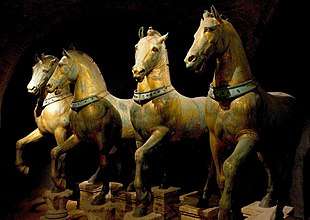
A quadriga (Latin quadri-, four, and iugum, yoke) is a car or chariot drawn by four horses abreast (the Roman Empire's equivalent of Ancient Greek tethrippon). It was raced in the Ancient Olympic Games and other contests. It is represented in profile as the chariot of gods and heroes on Greek vases and in bas-relief. The quadriga was adopted in ancient Roman chariot racing. Quadrigas were emblems of triumph; Victory or Fame often are depicted as the triumphant woman driving it. In classical mythology, the quadriga is the chariot of the gods; Apollo was depicted driving his quadriga across the heavens, delivering daylight and dispersing the night.
The word quadriga may refer to the chariot alone, the four horses without it, or the combination.
Classical sculpture
Modern sculptural quadrigas are based on the four bronze Horses of Saint Mark or the "Triumphal Quadriga", a set of equine Roman or Greek sculptures, the only quadriga to survive from the classical world, and the pattern for all that follow.[1] Their age is disputed. Originally erected in the Hippodrome of Constantinople, possibly on a triumphal arch, they are now in St Mark's Basilica in Venice. Venetian Crusaders looted these sculptures in the Fourth Crusade (which dates them to at least 1204) and placed them on the terrace of St Mark's Basilica. In 1797, Napoleon carried the quadriga off to Paris, but in 1815 the horses were returned to Venice. Due to the effects of atmospheric pollution, the original quadriga was retired to a museum and replaced with a replica in the 1980s.
A quadriga also appears at the Libyco-Punic Mausoleum of Dougga, which dates to the 2nd century BC.
Modern quadrigas
Some of the most significant full-size free-standing sculptures of quadrigas include, in approximate chronological order:
- 1793 – The Berlin Quadriga was designed by Johann Gottfried Schadow in 1793 as the Quadriga of Victory, perhaps[2] as a symbol of peace (represented by the olive wreath carried by Victory). Located atop the Brandenburg Gate in Berlin, Germany, it was seized by Napoleon during his occupation of Berlin in 1806, and taken to Paris. It was returned to Berlin by Field Marshal Gebhard von Blücher in 1814. Her olive wreath was subsequently supplemented with an Iron Cross. The statue suffered severe damage during the Second World War, and the association of the Iron Cross with Prussian militarism convinced the Communist government of East Germany to remove this aspect of the statue after the war. The iron cross was restored after German reunification in 1990.[3]
- c. 1815 – The Carrousel quadriga is situated atop the Arc de Triomphe du Carrousel in Paris, France. The arch itself was built to commemorate the victories of Napoleon, but the quadriga was sculpted by Baron François Joseph Bosio to commemorate the Restoration of the Bourbons. The Restoration is represented by an allegorical goddess driving a quadriga, with gilded Victories accompanying it on each side.
- 1819–1829 – The Quadriga on the General Staff Building on the Palace Square in Saint Petersburg
- 1828–1832 – The Quadriga on the Alexandrinsky Theater, in Saint Petersburg
- c. 1841 – The Panther Quadriga on the Semperoper in Dresden
- 1845–1848 – The Quadriga on top of Thorvaldsen Museum in Copenhagen by Hermann Wilhelm Bissen and Stephan Ussing
- c. 1850 – The Quadriga on the Bolshoi, above the portico of the Bolshoi Theatre designed by sculptor Peter Clodt von Jürgensburg
- c. 1852 – The Siegestor (Victory Gate) in Munich is topped by a lion quadriga created by Martin von Wagner
- 1868 – The Quadriga on the ducal palace in Braunschweig was destroyed in 1944 during the Second World War. It was reconstructed in 2008 and is considered as the largest one in Europe
- 1893 – Columbus Quadriga atop the Peristyle Building, World's Columbian Exposition, Daniel Chester French, sculpture.[4]
- 1895 – The Quadriga of Brabant, situated on top from Parc du Cinquantenaire (1880–1905); built for the 50 years of Belgian Independence, in Brussels, Belgium, was built by Thomas Vinçotte and Jules Lagae
- c. 1900 – Two Quadrigas on the Grand Palais in Paris, the work of French sculptor Georges Récipon
- c. 1900 – Atop the Arch at Grand Army Plaza in Brooklyn, New York, lady Columbia, an allegorical representation of the United States, rides in a chariot drawn by two horses. Two winged Victory figures, each leading a horse, trumpet Columbia's arrival. The sculptor was Frederick William MacMonnies.
- 1904[5] – Victory and Progress, horse-drawn chariots by J. Massey Rhind on the Wayne County Building in Detroit, Michigan, though each of the two chariots is drawn by three instead of the customary four horses.
- 1906 – Progress of the State at the Minnesota State Capitol is unique for being entirely covered in gold leaf, and is situated above a building entrance rather than a triumphal arch. It was sculpted by Daniel Chester French and Edward Clark Potter.[6]
- 1911–1935 – The Monument to Vittorio Emanuele II (Monument of Victor Emmanuel II, or Altare della Patria (Altar of the Nation), or "Il Vittoriano") in Rome, Italy features two statues of goddess Victoria riding on quadrigas.
- 1912 – The Wellington Arch Quadriga is situated atop the Wellington Arch in London, England. It was designed by Adrian Jones. The sculpture shows a small boy (actually the son of Lord Michelham, the man who funded the sculpture) leading the quadriga, with Peace descending upon it from heaven.
- 1919–1923 – The former Banco di Bilbao headquarters at no. 16 Calle de Alcalá in Madrid, now part of Banco Bilbao Vizcaya Argentaria, features two quadrigas on a commercial building. The building was designed by Ricardo Bastida, with the sculptor of the chariot Higinio Basterras, and other sculptures by Quentin de la Torre. The charioteers are helmeted men standing on the handrails of the chariots. Height to plinth: about 87 feet (27 meters).
- 1987 – The Greenwood Quadriga in Fort Worth, Texas at Greenwood Memorial Park (Fort Worth)
- 2002 – The Grand Theatre, Warsaw features a quadriga reflecting the original Antonio Corazzi's 1833 plans for the building, but not commissioned and executed until 2002.
Gallery
.jpg)

 The goddess Venus riding a quadriga of elephants, fresco from Pompeii, 1st century AD
The goddess Venus riding a quadriga of elephants, fresco from Pompeii, 1st century AD Apollo as the sun god; cast of the "Sarcofago matti" (c. 220 AD)
Apollo as the sun god; cast of the "Sarcofago matti" (c. 220 AD)
 Brandenburg Gate Quadriga at night.
Brandenburg Gate Quadriga at night.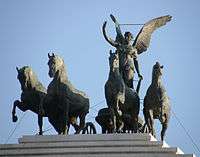 The Quadriga dell'Unità at Vittoriano, Rome
The Quadriga dell'Unità at Vittoriano, Rome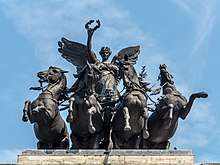 Quadriga, Wellington Arch, London
Quadriga, Wellington Arch, London- Brabant Raising the National Flag or Quadriga of Brabant, Parc du Cinquantenaire, Brussels
 Quadriga, Arc de Triomphe du Carrousel, Paris
Quadriga, Arc de Triomphe du Carrousel, Paris_Buddy_B%C3%A4r_10_Jahre_Neues_Kranzler_Eck.jpg) Buddy Bear Quadriga in Berlin, Kurfürstendamm 21
Buddy Bear Quadriga in Berlin, Kurfürstendamm 21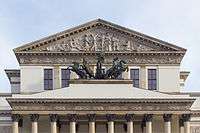 Quadriga, Grand Theatre, Warsaw
Quadriga, Grand Theatre, Warsaw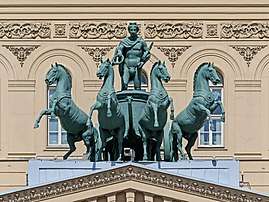 A quadriga sculpted by Peter Clodt von Jürgensburg at Bolshoi Theater
A quadriga sculpted by Peter Clodt von Jürgensburg at Bolshoi Theater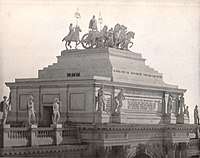
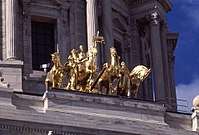 Daniel Chester French & Edward Clark Potter, Minnesota State Capitol 1905
Daniel Chester French & Edward Clark Potter, Minnesota State Capitol 1905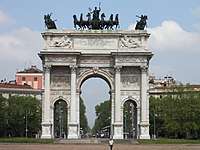 The Quadriga of the Arch of Peace in Milan
The Quadriga of the Arch of Peace in Milan- Quadriga in the Parc de la Ciutadella in Barcelona
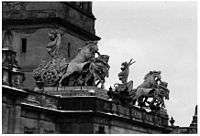 Wayne County Building, Detroit, Michigan, by J. Massey Rhind
Wayne County Building, Detroit, Michigan, by J. Massey Rhind The quadriga driven by Apollo, a sculptural composition on the pediment of the Bolshoi Theatre, Moscow.
The quadriga driven by Apollo, a sculptural composition on the pediment of the Bolshoi Theatre, Moscow.
See also
- Horses of Saint Mark in Venice, remnants of a quadriga of Constantinople taken by Enrico Dandolo.
- Biga, the ancient two-horse chariot.
- Trigarium (triga)
- Troika
References
- ↑ Annual Report of the American Scenic and Historic Preservation Society to the Legislature of the State of New York, Volume 18, by American Scenic and Historic Preservation Society, 1913, page 344
- ↑ "A Point of View: The European dream has become a nightmare". 18 May 2012 – via www.bbc.co.uk.
- ↑ Brandenburg Gate. Archived February 24, 2008, at the Wayback Machine. Berlin – Offizielles Stadtportal der Hauptstadt Deutschlands – Berlin.de.
- ↑ http://photoarchive.lib.uchicago.edu/db.xqy?one=apf3-00089.xml
- ↑ Rhind, John Massey; Scott, John (31 May 2018). "Victory and Progress" – via siris-artinventories.si.edu Library Catalog.
- ↑ "Historic Adventures". mnhs.org.
| Wikimedia Commons has media related to Quadriga. |
External links

- Quadriga Encyclopaedia Romana. University of Chicago
- Quadriga
- (in German) Berlin.de: Brandenburger Tor, Pariser Platz, Quadriga